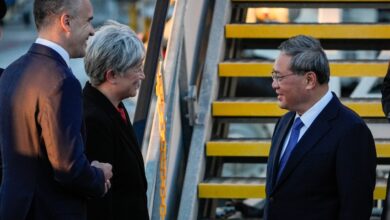Why Israel Has Not Yet Lost Europe
Why Israel has not yet lost Europe? It’s a question that delves far beyond simple headlines. This isn’t just about political alliances or economic ties; it’s a story woven from centuries of complex interactions, shifting geopolitical landscapes, and enduring cultural exchanges. We’ll explore the historical roots of this relationship, examining periods of both cooperation and conflict, and analyze the economic and strategic factors that continue to bind Israel and Europe together.
From the intricate web of trade agreements and technological collaborations to the shared values and strategic interests that underpin their alliances, we’ll uncover the multifaceted nature of this enduring bond. We’ll also confront the challenges and potential threats that could jeopardize this relationship, offering insights into the future trajectory of this vital connection.
Historical Context
Israel’s relationship with Europe has been a complex and evolving one since its establishment in 1948. Marked by periods of both strong support and significant opposition, this relationship reflects the broader geopolitical landscape and the enduring impact of the Holocaust and the Arab-Israeli conflict. Understanding this historical context is crucial to grasping the current state of affairs.The immediate aftermath of Israel’s creation saw a diverse response from European nations.
Some, particularly those with a history of antisemitism and a strong sense of guilt over the Holocaust, offered significant support, both politically and materially. Others, bound by colonial ties to Arab nations or influenced by Cold War alliances, adopted a more neutral or even hostile stance. This initial division set the stage for the fluctuating dynamics that would characterize the relationship for decades to come.
Early Diplomatic Ties and the Cold War
The early years were defined by the Cold War’s influence. The Soviet Union, initially supportive of Israel, shifted its allegiance towards Arab states as the conflict intensified. This realignment significantly impacted the geopolitical landscape and forced many European nations to navigate complex alliances. Western European countries, largely aligned with the United States, tended to support Israel, though often cautiously, balancing their commitment to Israel with their interests in maintaining relations with Arab states, particularly those rich in oil.
This period saw the establishment of diplomatic relations with many European countries, but also witnessed significant boycotts and political maneuvering by Arab nations aimed at isolating Israel.
The Six-Day War and its Aftermath
The 1967 Six-Day War was a watershed moment. While some European countries condemned Israel’s actions, others saw it as a necessary response to existential threats. The war solidified existing alliances and further exposed the divisions within Europe regarding the Israeli-Palestinian conflict. The subsequent occupation of Palestinian territories created new challenges for Israel’s relations with Europe, with growing criticism from many European governments and civil society groups regarding human rights issues and the expansion of Israeli settlements.
The Oslo Accords and Subsequent Developments
The Oslo Accords of the 1990s represented a period of cautious optimism. Many European nations welcomed the prospect of peace, providing significant financial and diplomatic support to the peace process. However, the subsequent collapse of the peace talks and the outbreak of the Second Intifada led to renewed tensions. European criticism of Israeli policies increased, particularly concerning the use of force and the treatment of Palestinians.
This period also saw the rise of pro-Palestinian activism within Europe, further complicating the relationship.
Differing European Approaches
Throughout history, European powers have demonstrated diverse approaches towards Israel. Countries like France and the United Kingdom, with historical ties to the region, have maintained complex relationships, often balancing support for Israel with their broader regional interests. Germany, grappling with its historical guilt, has consistently been a strong supporter of Israel, providing significant financial aid and offering vocal support in international forums.
Scandinavian countries have often taken a more critical stance on Israeli policies, particularly regarding the Palestinian issue, reflecting a strong commitment to human rights. This variety of approaches highlights the multifaceted nature of the relationship between Israel and Europe, demonstrating that it’s not a monolithic entity but a complex tapestry of individual national interests and perspectives.
Economic Factors: Why Israel Has Not Yet Lost Europe
Israel and the European Union share a robust and multifaceted economic relationship, crucial to both entities’ prosperity. This interdependence, built on trade, investment, and technological collaboration, has proven resilient despite geopolitical complexities. Understanding the economic ties between Israel and the EU is key to grasping the enduring nature of their relationship.
Economic Interdependence Between Israel and the European Union
The EU is consistently one of Israel’s largest trading partners, and vice versa. This interdependence is characterized by a significant two-way flow of goods, services, and investments. Israel benefits from access to the EU’s vast single market, while the EU gains access to Israeli innovation and specialized industries. This relationship extends beyond simple trade; it includes substantial foreign direct investment (FDI) from EU countries into Israeli businesses, particularly in high-tech sectors.
This mutually beneficial arrangement strengthens both economies and fosters ongoing collaboration.
Key Trade Sectors and Investment Flows
Several key sectors drive the economic exchange between Israel and the EU. High-technology, including software, cybersecurity, and medical devices, represents a significant portion of Israeli exports to the EU. Agriculture, specifically high-value agricultural products, also plays a notable role. The EU, in turn, exports a wide range of manufactured goods, machinery, and consumer products to Israel. Investment flows primarily target Israel’s dynamic tech sector, with significant EU investment in startups and established tech companies.
This flow of capital fuels innovation and economic growth in Israel.
Israel’s enduring influence in Europe isn’t just about politics; it’s about a deeper cultural exchange. Think about the unexpected connections – for instance, the sheer diversity of Israeli culture mirrors the incredible biodiversity found in places like Yellowstone National Park, where you can explore the amazing variety of animals such as in the mammals of Yellowstone. This vibrant interconnectedness, much like the Yellowstone ecosystem, helps explain why Israel maintains its strong presence in Europe.
The Role of Technology and Innovation
Technology and innovation are central to the Israel-EU economic relationship. Israel’s reputation as a “startup nation” attracts substantial EU investment in research and development, fostering collaboration on cutting-edge technologies. This collaboration extends to joint research projects, technology transfer, and the establishment of joint ventures. The EU’s support for Israeli innovation contributes significantly to Israel’s economic competitiveness on a global scale, while Israel’s technological advancements benefit the EU through access to cutting-edge solutions and innovations.
Top 5 European Trading Partners of Israel
The following table illustrates Israel’s top five trading partners within Europe, highlighting the volume of trade and key goods exchanged. Data is approximate and can fluctuate year to year.
| Rank | Country | Approximate Trade Volume (USD Billion) | Key Goods |
|---|---|---|---|
| 1 | Germany | 5-6 | High-tech products, machinery, chemicals, agricultural products |
| 2 | United Kingdom | 3-4 | High-tech products, pharmaceuticals, diamonds, agricultural products |
| 3 | France | 2-3 | High-tech products, cosmetics, aerospace components, agricultural products |
| 4 | Netherlands | 1-2 | High-tech products, diamonds, chemicals, agricultural products |
| 5 | Italy | 1-2 | High-tech products, machinery, fashion, agricultural products |
Political and Strategic Alliances
Israel’s survival and geopolitical standing are significantly shaped by its network of political and strategic alliances with European nations. These alliances, forged over decades, are underpinned by shared security concerns, economic interests, and, to a considerable extent, shared democratic values. While not always without friction, these partnerships are crucial for Israel’s ability to navigate the complex political landscape of the Middle East and beyond.Israel’s relationships with European countries are multifaceted and evolve dynamically.
Israel’s enduring influence in Europe isn’t solely about geopolitics; it’s also about shared values and the strength of its diaspora. However, the erosion of trust, exemplified by the heavy-handed approach of some during the pandemic, poses a threat. Learning from the actions of those who pushed for vaccine mandates, as highlighted by this Maryland AG candidate’s campaign politicians behind covid 19 vaccine mandates should be brought to justice maryland ag candidate , is crucial to maintaining those bonds.
Ultimately, Israel’s continued success in Europe depends on fostering trust and transparency.
They aren’t solely based on formal treaties but also encompass informal collaborations, intelligence sharing, and diplomatic support within international forums like the United Nations. The strength and nature of these alliances vary depending on the specific country and the prevailing geopolitical climate.
Israel-EU Relations
The relationship between Israel and the European Union is a complex one, characterized by both cooperation and tension. The EU is a major trading partner for Israel and a significant source of foreign investment. However, disagreements persist over the Israeli-Palestinian conflict, particularly concerning Israeli settlement activity in the West Bank. Despite these disagreements, the EU remains a key player in regional security discussions and often acts as a mediator between Israel and its Arab neighbors.
The EU’s engagement with Israel extends beyond trade and encompasses areas such as research and development, technological collaboration, and cultural exchange. This broad spectrum of engagement reflects the intricate nature of the relationship.
Bilateral Agreements with Key European Nations, Why israel has not yet lost europe
Several key bilateral agreements and declarations highlight the depth and breadth of Israel’s alliances with individual European nations. These agreements demonstrate a commitment to various forms of cooperation, including defense, technology, and economic development. While the specific details of these agreements often remain confidential for security reasons, their existence signifies a commitment to shared strategic interests and mutual support.
- France: A long-standing strategic partner, France has consistently provided diplomatic support to Israel and has engaged in significant defense cooperation. This includes collaborative projects in areas like aerospace and intelligence gathering.
- Germany: Despite the historical context, Germany and Israel have developed a strong and multifaceted relationship. Germany is a major trading partner for Israel and provides significant financial aid. This relationship reflects a commitment to reconciliation and a shared interest in regional stability.
- United Kingdom: The UK maintains strong diplomatic and security ties with Israel, including intelligence sharing and defense cooperation. The two countries share common interests in counter-terrorism and regional security.
The Role of Shared Values and Strategic Interests
The enduring nature of Israel’s alliances with European nations stems from a convergence of values and strategic interests. Many European countries share Israel’s commitment to democratic values, the rule of law, and human rights. Furthermore, the shared concerns regarding terrorism, regional instability, and the proliferation of weapons of mass destruction create a strong basis for cooperation. These shared concerns often outweigh disagreements on specific policies related to the Israeli-Palestinian conflict.
The strategic imperative of maintaining regional stability is a powerful driver of these alliances, fostering cooperation despite occasional political friction.
Cultural and Societal Connections
The relationship between Israel and Europe transcends the political and economic spheres; it’s deeply rooted in shared cultural values, artistic expression, and the enduring influence of diaspora communities. This intricate web of connections has fostered a vibrant exchange, shaping both societies in profound ways. The impact is evident in collaborations across various fields, from academia and technology to the arts and culinary traditions.Israel’s cultural influence on Europe is multifaceted.
Its contributions to contemporary art, film, literature, and music have resonated across the continent, enriching the European cultural landscape. Conversely, Europe’s rich history and artistic traditions have profoundly impacted Israeli culture, creating a dynamic interplay of ideas and influences. The presence of significant Jewish diaspora communities throughout Europe further strengthens these connections, serving as a bridge between cultures and fostering mutual understanding.
Israel’s continued influence in Europe isn’t solely about political maneuvering; it’s also about resilience. Think about the sheer force of nature – reading about the devastation caused by Hurricane Milton in Florida, as reported in this article hurricane milton is devastating florida worse storms are yet to come , makes you realize how unpredictable the world can be.
Yet, despite facing its own challenges, Israel maintains its connections, showcasing a similar strength and adaptability in the face of adversity.
Cultural Exchange and Collaboration Examples
Numerous examples showcase the breadth and depth of cultural exchange between Israel and Europe. Joint research projects in universities across various fields, from medicine to archaeology, are common. Co-productions in film and television are increasingly prevalent, with Israeli talent frequently collaborating with European filmmakers and actors. The exchange of artists and musicians through residencies and performances regularly occurs, fostering creative dialogue and shared artistic experiences.
For instance, the annual “Israel Festival” in various European cities showcases Israeli dance, theater, and music, exposing European audiences to a diverse range of Israeli artistic expressions. Similarly, European cultural events are frequently hosted in Israel, providing a platform for European artists and enriching Israeli cultural life.
Impact of Israeli Culture and Arts on European Societies
Israeli cinema, known for its unique blend of realism and social commentary, has gained significant international acclaim, including within Europe. Films exploring themes of identity, conflict, and social justice have sparked dialogues and influenced filmmaking styles across the continent. Israeli literature, often tackling complex political and social issues, has been translated and widely read in Europe, enriching literary discourse and expanding perspectives.
Israeli music, drawing from diverse influences, has also found a receptive audience in Europe, contributing to the continent’s vibrant musical tapestry. This cultural exchange isn’t one-sided; European art and literature have also significantly influenced Israeli creative output.
Role of Diaspora Communities in Shaping the Relationship
Jewish communities across Europe, with their rich history and cultural contributions, have played a crucial role in fostering connections between Israel and Europe. These communities act as cultural bridges, facilitating dialogue, promoting understanding, and facilitating collaborations across various fields. Their presence helps to maintain a constant flow of cultural exchange and strengthens the bond between Israel and Europe.
The involvement of diaspora organizations in educational programs, cultural initiatives, and political advocacy further reinforces this connection. For example, many European Jewish communities actively support cultural exchange programs between Israel and their respective countries.
A Narrative of Cultural Exchange: The “Shared Stage” Project
Imagine a collaborative theatre project, “Shared Stage,” initiated between a renowned Israeli theatre company and a prestigious German theatre. The project involved a joint production of a play exploring themes of reconciliation and overcoming historical trauma, drawing on both Israeli and German experiences. Israeli and German actors worked side-by-side, sharing their perspectives and cultural backgrounds, resulting in a powerful and moving performance that resonated deeply with audiences in both countries.
The project culminated in a series of workshops and discussions, fostering dialogue and mutual understanding between the two groups. This collaborative effort transcended language barriers and cultural differences, creating a shared artistic experience that reflected the evolving relationship between Israel and Europe.
Challenges and Potential Threats to the Relationship
The seemingly strong bond between Israel and Europe isn’t without its fault lines. Several significant challenges and potential threats constantly test the resilience of this relationship, often stemming from deeply rooted historical grievances, conflicting geopolitical interests, and the volatile nature of the Middle East. These challenges necessitate ongoing dialogue and a commitment from both sides to navigate the complexities of their shared future.The impact of regional conflicts and geopolitical instability on the Israel-Europe relationship is profound and multifaceted.
The ongoing Israeli-Palestinian conflict, for example, remains a major point of contention, with differing European and Israeli perspectives on the conflict’s resolution shaping their interactions. Furthermore, the rise of extremist groups and the broader instability in the Middle East directly affect European security concerns and consequently influence their approach to Israel.
The Israeli-Palestinian Conflict’s Impact
The Israeli-Palestinian conflict casts a long shadow over the Israel-Europe relationship. European nations generally advocate for a two-state solution based on the pre-1967 borders with mutually agreed land swaps, emphasizing the importance of Palestinian self-determination and an end to the occupation. This position often clashes with Israeli government policies, leading to strained relations and disagreements over the appropriate response to violence and settlements.
Public opinion in Europe, influenced by media coverage and humanitarian concerns, can be critical of Israeli actions, putting pressure on European governments to adopt a more critical stance towards Israel. Conversely, Israel often feels that Europe doesn’t adequately acknowledge security threats and the complexities of the conflict, leading to accusations of bias and a lack of understanding. This divergence in perspectives creates a significant hurdle to closer cooperation.
The Rise of Antisemitism in Europe
A resurgence of antisemitism across Europe poses a serious threat to the Israel-Europe relationship. While many European countries have strong legal frameworks to combat antisemitism, the rise of far-right extremism and anti-Zionist sentiments, often intertwined with antisemitism, presents a considerable challenge. These sentiments can manifest in various forms, from hate speech and online harassment to physical violence against Jewish communities.
This creates a climate of fear and distrust, impacting the well-being of Jewish communities in Europe and potentially affecting their relationship with Israel. Furthermore, the blurring of lines between criticism of Israeli policies and antisemitism creates a complex environment where genuine concerns about human rights are sometimes conflated with anti-Jewish prejudice. This makes it difficult for both sides to engage in open and honest dialogue without accusations of bias.
Geopolitical Competition and Shifting Alliances
The changing geopolitical landscape, particularly the rise of new global powers and the shifting alliances in the Middle East, also impacts the Israel-Europe relationship. Competition for influence in the region, particularly from countries like Russia, China, and Iran, can create tensions and influence the priorities of both European nations and Israel. For instance, European concerns about Russian influence in the region might lead them to adopt policies that are perceived by Israel as less supportive.
Similarly, Israel’s strategic alliances and its relationship with the United States can sometimes affect its interactions with Europe. This complex interplay of geopolitical factors requires careful navigation to avoid misunderstandings and maintain a constructive partnership.
Visual Representation: Impact of Antisemitism on Israel-Europe Relations
Imagine a graph charting the relationship between Israel and Europe. The y-axis represents the strength of the relationship, ranging from strong cooperation to significant tension. The x-axis represents time. Initially, the line shows a relatively stable, positive relationship. However, as incidents of antisemitism in Europe increase (represented by spikes on the graph), the line dips downwards, showing a decline in the strength of the relationship.
Each spike represents a significant antisemitic incident, whether it’s a major attack, a rise in hate speech, or a political event fueled by antisemitic rhetoric. The dips are not immediate or uniform; there are periods of recovery and attempts at reconciliation, but the overall trend shows a weakening of the relationship in direct correlation with the increase in antisemitic acts.
The graph visually demonstrates how the rise of antisemitism in Europe, even if not directly targeting Israel, significantly impacts the overall relationship, undermining trust and cooperation.
Future Prospects and Predictions
The relationship between Israel and Europe is dynamic and complex, shaped by a multitude of factors constantly in flux. Predicting the future is inherently uncertain, but by analyzing current trends and potential disruptions, we can Artikel plausible scenarios for the coming decades. This analysis will consider the impact of technological advancements, demographic shifts, and varying policy choices on the trajectory of this crucial relationship.
Several factors will significantly influence the future of Israel-Europe relations. The interplay of these factors will determine whether the relationship deepens, stagnates, or even deteriorates. A key element will be how both sides adapt to global challenges and emerging opportunities.
Technological Advancements and Their Impact
Technological advancements, particularly in areas like artificial intelligence, cybersecurity, and renewable energy, will significantly shape the Israel-Europe relationship. Israel’s technological prowess, particularly in cybersecurity and AI, will continue to be a valuable asset for European nations seeking to enhance their own capabilities. Increased collaboration in research and development is likely, leading to joint ventures and the sharing of expertise.
However, potential challenges exist, such as concerns over data privacy and the ethical implications of advanced technologies, requiring careful negotiation and regulatory frameworks. For example, the development of joint cybersecurity initiatives to counter cyber threats could deepen cooperation, while disagreements over the use of AI in surveillance might create friction.
Demographic Shifts and Their Influence
Demographic shifts within both Europe and Israel will impact the relationship. Europe’s aging population and potential labor shortages could create opportunities for collaboration with Israel, which has a relatively younger and more technologically skilled workforce. This could lead to increased migration of Israeli professionals to Europe, or joint projects aimed at addressing Europe’s demographic challenges. Conversely, rising nationalism and anti-immigration sentiment in some European countries might create obstacles to closer ties.
The potential for increased cultural exchange, however, remains a positive factor, provided that mutual understanding and respect are fostered. For instance, increased Israeli investment in European tech startups could create jobs and boost economic growth, while a rise in antisemitic incidents could damage the relationship.
Impact of Different Policy Choices
Different policy choices by both Israel and European nations will significantly influence the future trajectory of their relationship. A continued commitment to diplomacy and dialogue, coupled with efforts to address shared concerns like climate change and security, will likely strengthen the bond. Conversely, increased political polarization in either region, escalating conflicts in the Middle East, or the rise of protectionist trade policies could strain the relationship.
For example, stronger EU support for a two-state solution in the Israeli-Palestinian conflict could foster closer ties, while a more critical stance towards Israeli policies could lead to increased tension. Similarly, increased economic cooperation through trade agreements could benefit both sides, while trade disputes could negatively affect the relationship.
The relationship between Israel and Europe is far from static. It’s a dynamic interplay of history, economics, politics, and culture, constantly evolving in response to global events and domestic shifts. While challenges undoubtedly exist, the deep-rooted connections, spanning centuries and encompassing various facets of life, suggest that the narrative of Israel and Europe is far from over. The future of their relationship will depend on navigating these challenges with foresight, understanding, and a commitment to mutual respect and shared interests.
It’s a story that continues to unfold, and one worth following closely.




